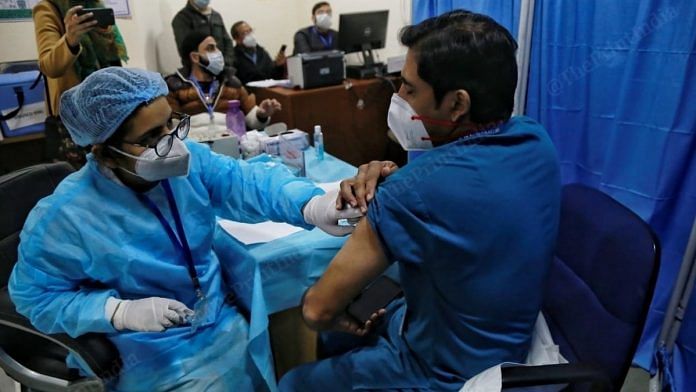New Delhi: Several vaccination centres in Delhi are planning to start conducting antibody titer tests on Covid-19 vaccine beneficiaries. These tests will help determine the efficacy of the vaccine by analysing the levels of antibodies present in the blood.
Of these, Rajiv Gandhi Super Speciality Hospital (RGSSH) has already started the tests after receiving approval from its ethics committee. “These are simple serological tests and after the vaccination, the people who are interested can voluntarily participate in this test,” medical director Dr B.L. Sherwal told ThePrint.
According to him, blood samples will be taken from participants three times — once each after the first and second dose, and then two to four weeks after the second dose.
Rajiv Garg, Director General, Health Services, in the Union Ministry of Health and Family Welfare, had earlier told the ThePrint that no formal plan has been formulated at the central government level but “hospitals can do it at their own level and have complete freedom to take permission from the local ethical committee to carry this out for research purposes”.
ThePrint spoke to several experts to understand more about these titer tests and why it’s important to conduct them alongside the ongoing vaccine drive.
Also read: Over 50% people in 10 Delhi districts show Covid antibodies, latest sero survey says
What these tests are
Antibodies or immunoglobulins are proteins produced by the immune system to fight and “neutralise” pathogens like bacteria and viruses. A vaccine typically mimics an infection, making the body believe that it is being invaded by pathogens. The body then generates antibodies, which give it protection against the real disease.
So a way to determine whether a vaccine is efficacious is to analyse how many antibodies it has generated.
“The way the sero-positivity test is done is that you take a drop of blood from the individual and take out the serum, which contains the antibodies. Then add an antigen or protein of the virus, if there’s a specific antibody present, it will come and bind which is picked by the detection system used in the assay,” said Rakesh Mishra, director of Hyderabad-based Centre for Cellular and Molecular Biology (CCMB).
The antibodies can be detected through various methods. One of them includes the use of spectrofluorometer — a machine that helps analyse the levels of antibodies through fluorescence signals produced when antigens and antibodies bind.
“The intensity of the signal will tell how much antibodies there are. It is not an absolute quantification, it is a relative quantification,” Mishra said.
Dr Manoj Jais, director-professor, microbiology department, Lady Hardinge Medical College in the national capital, explained that the process of quantification involves a “calibration curve”.
“The quantitative estimation is done through the Enzyme-Linked Immunosorbent Assay (ELISA) method… These kits have calibrators, which are basically standards that if this is positive this is the titer (measures of the amount of a substance in a solution) and if this is negative then this is the titer. So there are four-five calibrators like this,” he said.
Values from these calibrators are plotted to create a standard graph, which is then used to determine the level of antibodies in the blood.
Notably, such titer tests conducted using the ELISA method do not check for neutralising antibodies that are responsible for defending cells against pathogens. “If antibodies are being produced after the vaccination then it is from the vaccine itself,” said Jais.
Also read: Covid vaccine Sputnik V has 91.6% efficacy, Lancet report says. Makers expecting India nod
‘Confidence-building’
According to Sherwal, the tests will serve as a “confidence-building” exercise for the ongoing immunisation drive.
“Say we have a sample size of around 300 beneficiaries for the test. Then through the outcome of this study, we will be able to see if antibody levels are raised in a majority of people. Then we will be able to advocate to more and more people that so many have taken the vaccine and it has shown a good antibody response,” he said.
Mishra said this is especially important right now because the Covid-19 vaccines are new and not time-tested.
“So we do not know how long they will protect, whether the people who are vaccinated have raised levels of antibodies or whether there will be other defences like cell-based immunity,” he said.
Then there are other important questions around the immune responses of beneficiaries who end up contracting the virus despite being vaccinated, maximum efficacy in age groups, and duration of impact, among others.
“In fact, it should be followed for a year in a very active and a massive way and then in a controlled way for several years. Then we will be able to tell whether because of this vaccine people are able to fight the disease better,” he added.
Mishra also said this is the first time that such tests will be undertaken in a large and concerted way, which is important, because the vaccines are only being used with emergency authorisation and “none of them are fully approved”.
“We know very little about their long-term effects and if there are any unwanted side effects after several months… Imagine this kind of process gives some good vaccines, then there will be no point waiting for several years, we can have a vaccine every year,” he said.
Also read: 12 children given sanitiser instead of polio drops in Maharashtra



